Find your next job in your inbox.
Subscribe for AFCS’ automatic job announcement email notifications, and your next job just might find you.
It’s the perfect place to get your career off the ground. All you have to do is nail the landing.

Air Force Civilian Service (AFCS) subject matter experts are ready to meet you in the room ahead. Take a look at the map below for the workstations hosted by professionals in your area of interest, qualifications, and positions they’re seeking. If your qualifications are found to be a match, you may be invited to advance to the next room to interview with hiring managers. If not, AFCS recruiters are standing at the ready to discuss additional civilian opportunities with the Air Force.




AFCS financial managers track and report funding for various acquisition programs and systems, executing over $300B of active-year and foreign military sales funding. Our cost estimators work with integrated product teams to understand system and platform requirements and estimate the cost through the out-years, informing budgets submitted to Congress or Partner Nations for funding consideration.
While some in the Air Force drive aircraft and others drive innovation, it’s the job of Operations Research Analysts (ORAs) to drive the decisions that make everything else possible. They use mathematical and statistical techniques to analyze complex military problems and identify the best courses of action to achieve mission objectives. Their responsibilities include gathering and analyzing data, developing models and simulations, and presenting findings to military leaders. ORAs perform several crucial functions, from evaluating the effectiveness of weapons systems and optimizing supply-chain logistics to assessing the impact of new technologies, along with many other mission-critical duties.
Our cyberspace and IT workforce ensures the security of policy and planning, enterprise architecture, cybersecurity, application software, systems, network services, data management, systems administration, customer support, and IT program and project management, supporting the development, implementation, and maintenance of Air Force enterprise-wide systems.
Our agile logistics workforce is capable of meeting the full spectrum of AFLCMC logistics requirements and is integrated into the broad logistics enterprise. Logistics are involved in all phases of the product/acquisition life cycle, including design interface; sustaining engineering; supply support; maintenance planning and management; packaging, handling, storage and transportation (PHS&T); technical data; support equipment; training and training support; manpower and personnel; facilities and infrastructure; computer resources; and product support management.
Contract professionals support the Air Force, obligating over $35 billion by purchasing the equipment and services Airmen need to protect this great country. These purchases range from state-of-the-art aircraft and billion-dollar weapon systems to the night-vision goggles and aircraft simulators that make the Air Force sharpen the Air Force’s considerable edge. Contract professionals negotiate contracts with the corporate giants and defense industry partners, which puts you at the negotiating table with some of our top partners and business leaders. Our goal is to obtain the greatest technologies possible to support the warfighter and do so at a price that is fair and reasonable to both the defense contractor and the American taxpayer.
Program managers lead the creation of business strategies to design, develop, produce, test, deploy, and sustain every item in the U.S. Air Force’s inventory, as well as the contracted services support that the warfighter depends on to maintain a competitive advantage. From inception to retirement, program management professionals oversee multi-discipline teams to ensure cost, schedule, and performance goals are achieved to meet operational needs.
Scientists and engineers play central roles in maintaining the U.S. Air Force’s superiority by ensuring air, space, and cyber forces have, among other things, superior intelligence, surveillance, reconnaissance, precision engagement, and electronic warfare systems capabilities by developing, demonstrating, and transitioning advanced sensors and sensing technologies. Scientists and engineers are relied upon to provide key technical recommendations and decisions that directly contribute to our national defense.
Our security workforce is integral to ensuring cutting-edge technology and sensitive information that supports our warfighters is kept out of the hands of our adversaries. IP includes all facets of security activities ranging from information, personnel, industrial security, acquisition, internal programs, operations, and scientific and technical information programs and program protection planning.
Fueled by innovation, ingenuity, and a start-up mentality, Unified Platform/LevelUP Code Works is the principal cyber factory for the Air Force, developing rapidly deployable software capabilities in support of the Department of the Air Force and the Department of Defense’s most critical cyber missions. It’s responsible for developing, implementing, and maintaining the Development/Security/Operations (DevSecOps) software development toolkit across the Department of Defense and the armed services.
Black Label supports Offensive Cyber Warfare and Information Warfare for the Department of the Air Force and the Department of Defense by providing advanced DevSecOps capabilities and technologies that streamline software development and deploy it in non-traditional, innovative ways to meet warfighters’ every need the instant they need it.
Platform One is the official Development, Security, and Operations (DevSecOps) enterprise of the Department of Defense (DoD), congregating the top capabilities of the Software Factories at the core of its software ecosystem to create Cloud Native Computer Foundation (CNCF)-compliant Kubernetes distributions, infrastructure as code playbooks, hardened containers, and other Customer DevSecOps Platforms with baked-in security.
EITaaS partners with industry leaders to incorporate best-in-class commercial technology to standardize Department of the Air Force (DAF) IT services, improving the agility, reliability, and resiliency of IT data operations, while maximizing user productivity and optimizing mission readiness enterprise-wide.
Business and Enterprise System Product Innovation (BESPIN) develops cutting-edge digital solutions for Airmen and Guardians that delivers exceptional custom mobile experiences reliably anywhere, anytime, improving safety, quality of life, and mission success.
Kessel Run’s primary mission is to create scalable digital architecture to optimize all-domain command and control capabilities that define the next-generation air dominance systems, accelerate dynamic targeting, and establish a more resilient operating presence through Agile Combat Employment.
Cloud One provides valuable tools to significantly reduce software development costs while deploying powerful Risk Management Framework processes that allow applications to inherit a common infrastructure and entry-point for negotiating the cloud.